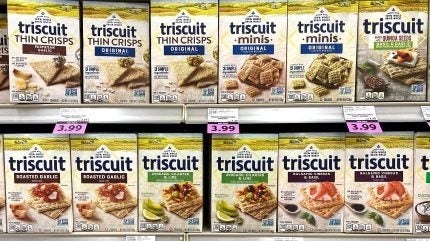
Multinational food company Mondelēz International has revealed plans to incorporate recycled plastic derived from advanced recycling technology for packaging used in most stock-keeping units of its Triscuit Crackers in the US and Canada.
This initiative aligns with the company’s target to incorporate approximately 5% recycled plastic content in its packaging by 2025.
The brand is now part of an innovative effort to enhance the sustainability of packaging by sourcing recycled plastics through the International Sustainability and Carbon Certification (ISCC)-certified mass balance approach.
As part of this effort, Mondelēz International is integrating up to 50% of plastic from advanced recycling technology into its bag-in-box liner films.
This complements the Triscuit brand’s existing use of 100% recycled paperboard for its outer box, of which 35% is post-consumer recycled content.
The move not only supports a circular pack economy in North America but also positions the brand as a proactive player in reducing plastic waste.
The sustainable packaging venture is projected to divert more than one million pounds of plastic waste from landfills annually.
Consumers can now find the new Triscuit packaging on supermarket shelves across the US and Canada.
Mondelēz International collaborated with Berry Global and LyondellBasell for the initiative.
Mondelēz International Packaging Sustainability research fellow Lou Fenech said: “We believe that sourcing material linked to advanced recycling technologies (mass balance) helps send a signal to the broader industry and can help to drive collection, sortation, and processing of more plastic waste.
“We strive to continually enhance our packaging with the aim of supporting a more circular economy for packaging. We do this through reducing and evolving packaging, improving systems, and leveraging innovative partnerships.”
In its journey towards sustainability, the Triscuit brand has focused on sourcing wheat sustainably, improving environmental metrics on farms, and supporting the Joint Monarch Venture for butterfly conservation.
Additionally, the brand contributed $100,000 to Michigan State University’s agricultural programme in 2023.



